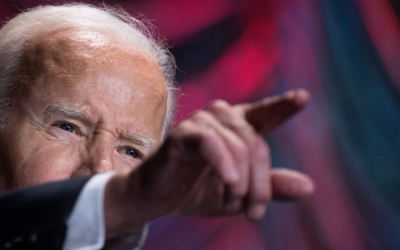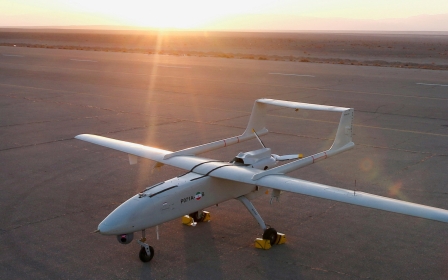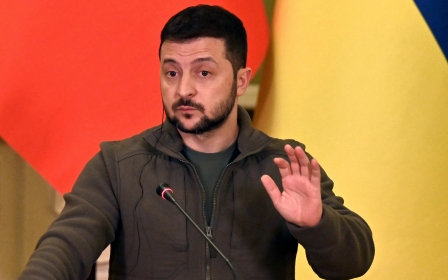Why Israel gets no US pushback for staying neutral on Russia-Ukraine

Last week, Israeli President Isaac Herzog visited Washington and met with US President Joe Biden and other top US officials, where he discussed the US-Israel relationship, the maritime agreement with Lebanon, and the Biden administration's "pledge to ensure Iran will never acquire a nuclear weapon".
Yet in all of his meetings with the administration, the war in Ukraine, into which the US has so far poured in $60bn to prop up Kyiv against Moscow, was only brought up in the context of Iranian drones being used by Russia.
Since February, Israel has maintained neutrality in the conflict. It has resisted providing weapons to bolster Ukraine's forces, rejecting a request from Kyiv to provide the country with the Iron Dome missile defence system.
It has also refrained from joining the US and other western countries in imposing sanctions on Russia.
Ukraine has even urged the US to pressure Israel into coming to Kyiv's aid, saying that "the Americans are the only country that Israel is listening to".
Ukrainian President Volodymyr Zelensky blamed Israel's neutrality in the conflict for the emergence of Iranian drones being used by Russia.
The lack of pressure on Israel to come to the aid of Ukraine and siding with the US - which provides Israel with $4bn in military aid each year - comes in stark contrast with how Washington has reacted to other countries accused of siding with Russia.
When Opec+ decided to cut production last month, the Biden administration lashed out with sweeping outrage, accusing Riyadh of siding with Russia and calling for a reevaluation of the entire bilateral relationship, adding that a review of arms sales to the kingdom was on the table.
Experts told Middle East Eye that the ability of Israel to refrain from choosing a side in the conflict despite how close it is to the US stems from a number of reasons, from the depth of US-Israeli ties to Israel's lobbying presence in Washington.
"The rules-based order often means that the rules don't apply to US partners. One can make an argument that Israel has benefited particularly from this double standard," Annelle Sheline, a research fellow at the Quincy Institute for Responsible Statecraft, told Middle East Eye.
"When Saudi Arabia is criticised, it does not have a domestic base of support to defend it, whereas Israel's domestic support is robust."
US-Israeli ties are not transactional
Israel's relationship with the US is constantly referred to in Washington as "ironclad", and according to the State Department, "Israel has no greater friend than the United States".
The strength of the two countries' relationship has persisted despite moments of tension or outrage coming from lawmakers or human rights groups.
Even prior to the war in Ukraine, Israeli forces have been responsible for the death and detention of American citizens with little to no rebuke from the US, and former Israeli Prime Minister Benjamin Netanyahu had repeatedly defied the Barack Obama administration and worked to undermine Washington in order to prevent a nuclear deal with Iran.
'The Saudi Arabia-US relationship seems to be more transactional'
- Kristian Coates Ulrichsen, Baker Institute for Public Policy
Kristian Coates Ulrichsen, Middle East fellow at the Baker Institute for Public Policy, said that part of the reason Israel has room to sit on the fence, in terms of the Ukraine conflict, is because of how broad and deep its ties with the US are.
In addition to receiving $4bn in military aid from the US, the countries have a bilateral trade of $50bn each year, and they also often vote in unison at the United Nations.
Unlike Israel, Saudi Arabia's relationship with the US has long been viewed through a lens of oil for security.
"The Saudi Arabia-US relationship seems to be more transactional. And so when one party doesn't uphold that transaction, it becomes more apparent," Ulrichsen said.
"The US-Israel relationship is so much deeper and broader than the one with Saudi Arabia that it can absorb more easily an instance when interests don't converge to the same extent."
In the context of the war in Ukraine, Israel is also able to frame its position as a matter of national security and its own sovereignty, messaging that is accepted by Washington. When Saudi Arabia said that Opec+'s goal for reducing production was to achieve balance and stability in the markets, the US countered by saying their market analysis doesn't support Saudi Arabia's claim.
"Israel's been much better at pushing for reasons for its position, in terms of one of the arguments is that Israel has more limited manoeuvrability because of Russia's presence in Syria, etc," Hugh Lovatt, a senior policy fellow with the Middle East and North Africa programme at the European Council on Foreign Relations, told MEE.
Israel regularly strikes Iranian positions in Syria, and Russia and Israel have in recent years established a hotline in which Moscow has allowed Israel to carry out these attacks within the Syrian airspace controlled by Russia.
"Whether you buy those arguments or not is a different thing, but I think those were sort of talking points that perhaps cut through a bit more."
Lovatt added that the position of Prime Minister Yair Lapid, in comparison to his predecessor Naftali Bennett who was even more neutral on the issue, "has also been quite useful in neutralising criticism".
This could change, however, with the elections in Israel ushering in a potential return of the former right-wing prime minister Benjamin Netanyahu, who had close relations with Russian President Vladimir Putin and was recently criticised for his rhetoric on the war by Ukraine's foreign minister.
Israel and UAE
Lovatt said that in order to understand the lack of US backlash to Israel, the country to look at for a proper comparison is not Saudi Arabia, but the United Arab Emirates, which has taken similar stances in the Ukraine conflict without the same political costs.
"The UAE was actually deeply in agreement with Saudi Arabia with Opec+ cuts, and there's been very little pushback on the UAE," he told MEE.
Abu Dhabi had publicly defended the production cuts. However, The Wall Street Journal reported on Monday that Emirati officials had expressed opposition to the timing of the cuts, with the Emirates secretly sending its national security adviser to Riyadh in September to dissuade Saudi Crown Prince Mohammed bin Salman from taking the move.
'It's about how deep the relationships are, how the quality of those relationships are'
- Hugh Lovatt, European Council on Foreign Relations
UAE Crown Prince Mohammed bin Zayed, the leader of the Gulf emirate, visited Russian President Vladimir Putin last month, even after the American outrage over the Opec+ decision. During the meeting, Putin hailed Russia's ties with the UAE.
Weeks later, the Emirati crown prince spoke with US Secretary of State Antony Blinken, and the two leaders "reaffirmed the strong US-UAE partnership, discussed pressing regional matters, and spoke about ways to broaden and deepen their wide-ranging cooperation".
"It's about how deep the relationships are, how the quality of those relationships are, and I suppose also to be quite clear, the lobby that the respective countries have at their disposal. And we all know about the UAE lobbying in the US," Lovatt said.
According to the non-profit watchdog OpenSecrets, the UAE in 2022 spent more than $20m in lobbying, either from the government or from the private sector. Since 2018, Israel has spent more than $100m on lobbying in the US.
And in comparison, Saudi Arabia spent just under $5m in 2022, most of which was spent by Neom Co to promote the $500bn futuristic Saudi megacity.
Israel becoming partisan issue
While Israel's lack of support for Ukraine has been largely unchallenged by the US, there has been a sliver of pressure coming from one place in the American government: Congress.
In the past several weeks, a handful of US lawmakers have pointed out the lack of support Israel is showing Ukraine.
Michael Turner, the top Republican on the House Intelligence Committee, said he was "personally disappointed" that Israel will not provide Ukraine with weapons.
"This is the time for all democracies and all individual countries that have a moral compass to stand together against this type of brutality," he told Politico.
Meanwhile, Senator Chris Murphy, a member of the Senate Foreign Relations Committee, iterated similar sentiments but went harder on calling out Israel.
"Israel needs to get off the sidelines. Israel is a part of the community of democracies and it needs to stand up for Ukrainian democracy," Murphy told CNN.
"I just don't buy that countries like Israel need to play both sides. This is a moment where you have to take a side and you have to stand with the people of Ukraine."
It remains to be seen whether the rhetoric coming from the lawmakers will translate into concrete action or legislation that could demand more from Israel. However, Sheline noted that the criticism towards Israel can also be seen as part of a greater trend in calling out the country, particularly over its treatment of Palestinians.
A poll from the University of Maryland published in April found that fewer than one percent of Democratic voters viewed Israel as a top ally of the US.
A 2021 poll found that 51 percent of respondents opposed fully unrestricted aid to Israel if it continued to expand settlements in the occupied West Bank, which are considered illegal under international law.
Another poll from March 2021 showed a majority of Democrats favoured applying more US pressure on Israel to resolve the conflict.
"Support for Israel was once fully bipartisan. More recently, we have seen some members of Congress, like Rashida Tlaib and Ilhan Omar, voicing critique of Israel's treatment of Palestinians," Sheline said.
"It is possible that, like many issues in America's increasingly polarised political landscape, support for Israel will be increasingly partisan."
Middle East Eye delivers independent and unrivalled coverage and analysis of the Middle East, North Africa and beyond. To learn more about republishing this content and the associated fees, please fill out this form. More about MEE can be found here.






